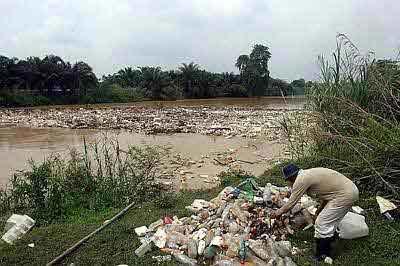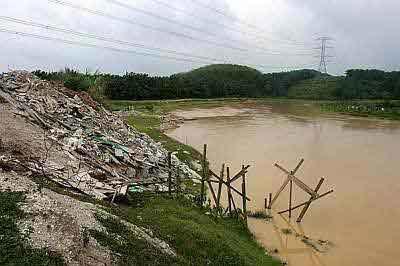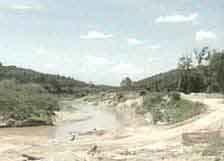Many of the 189 river basins in Malaysia are in a state of desperate water scarcity. Major cities in Malaysia, such as Kuala Lumpur and Malacca, may not have enough water due to over-exploited and polluted river basins. This warning from the Director-General of the Ministry of Irrigation and Drainage Malaysia, Keizrul Abdullah, may sound extreme, but it reflects the current reality in the country.
Mr. Keizrul Abdullah predicts that many regions in Malaysia, particularly the Klang Valley, will face a water crisis early next year unless relevant departments and the public begin to take the state of the rivers seriously.
 |
|
Litter everywhere: A person is collecting piles of plastic bottles along the Selangor River. (Photo: The Star) |
On one hand, Malaysia has river basins that are overexploited due to the problems caused by excessive development. On the other hand, the number of people relying on these rivers continues to grow as they are attracted by this development. This is the recipe for disaster.
Keizrul describes the situation facing Malaysia as “a classic case of rivers under the pressure of development.”
 |
|
Riverbank waste: Construction debris along the Selangor River is also a source of river pollution. (Photo: The Star) |
Pollution from industrial waste, sewage, and sediment is reducing water levels in the rivers. Humans are also extracting more water from these rivers, further diminishing river water levels and concentrating pollution.
Not only in the Klang Valley, but a water supply crisis is also imminent in Penang and Malacca. According to Keizrul Abdullah, this situation arises due to dry weather and ineffective management of water resources.
The issue of water scarcity during the dry season particularly affects overused river basins, as these basins have less groundwater reserves due to drainage systems that discharge rainwater into rivers and wastefully release it into the sea.
 |
|
Rampant sand mining has eroded the riverbanks in Selangor. (Photo: CNA) |
Unless this issue is addressed, there will come a time when some river basins in Malaysia will not have enough water to reach the sea during the dry season, let alone provide water for households.
Some river basins supplying clean water to residents have reached their limits. Currently, the water demand in Selangor and the Federal Territories is 2.5 billion liters per day, which is expected to double by 2010.
Therefore, Keizrul Abdullah advises that authorities must implement more comprehensive programs to prevent water catchment areas from being polluted by industries, establish better development policies and control methods, and operate water management systems more effectively. The public must also stop treating rivers as their toilets!
Given the current situation, Keizrul states that it is time for Malaysia to prioritize effective river management, as over 97% of Malaysia’s water supply comes from rivers, with the remainder sourced from groundwater. The public can contribute to government efforts by using water efficiently and not treating rivers as dumps. For instance, people can start by collecting and storing rainwater as previous generations did, using rainwater for washing and flushing toilets. Keizrul also suggests that the government increase water taxes to generate revenue for the establishment of a water fund to restore rivers.
Minh Thuong


















































